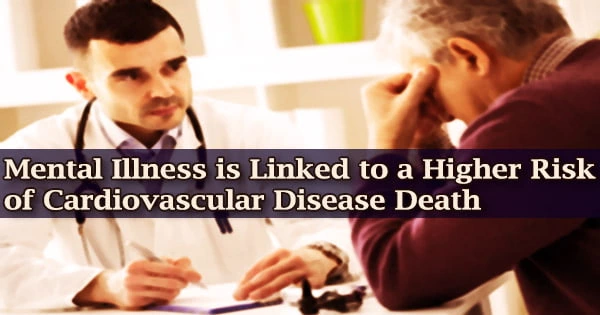According to a new study published April 19, 2022, in PLOS Medicine by Amanda Lambert of the University of Birmingham, UK, and colleagues, people with severe mental illnesses, such as schizophrenia, have higher rates of cardiovascular-related mortality than the general population, and this link has grown stronger in recent decades.
Mental illnesses are illnesses that cause changes in emotion, thought, or behavior (or a combination of these). Distress and/or issues functioning in social, job, or family activities are common symptoms of mental diseases.
People with severe mental illness had a greater incidence and death from cardiovascular disease, according to a previous study, but it’s unclear whether that link has altered over time.
Emotions, thinking, communication, learning, resilience, and self-esteem are all built on a foundation of mental health. Relationships, personal and emotional well-being, and contributing to the community or society all require good mental health. Many persons who suffer from mental illnesses are apprehensive about discussing their condition. It is, like heart disease or diabetes, a medical condition.
The current research includes a systematic review and meta-analysis of 108 prior studies involving almost 30 million people in high-income nations, all of whom were between the ages of 16 and 65 when they first developed a psychiatric condition.
The study discovered that patients with severe mental illness have a cardiovascular-related mortality risk that is roughly twice that of the general population (SMR 1.96, 95% CI: 1.61-2.39, p<0.001 for schizophrenia).
The increased relative risk of CVD diagnosis in more recent decades may be a result of disparity in smoking prevalence between people with SMI and the general population or increased use of antipsychotics. The changes since the 1990s approximately coincide with the release of newer, second-generation antipsychotics which are known to have worse metabolic effects.
Amanda Lambert
Cardiovascular diseases (CVDs) are the most common cause of death around the world. The majority of cardiovascular illnesses can be avoided by addressing behavioral risk factors such as tobacco use, poor diet and obesity, physical inactivity, and alcohol abuse.
It’s critical to recognize the cardiovascular illness as soon as possible so that treatment may begin with counseling and medications. People with schizophrenia are at higher risk than those with bipolar disorder, although the discrepancy exists across all types of severe mental illness and death from both cerebrovascular and cardiac causes.
When compared to controls, the pooled hazard ratio/rate ratio for coronary heart disease was 1.8 ((95% confidence interval (CI): 1.44-2.24, p<0.001), and the pooled standardized mortality ratio for cerebrovascular accidents was 1.93 (95% confidence interval (CI): 1.63-2.28, p<0.001).
The link between schizophrenia and cardiovascular-related mortality increased stronger between the 1970s and the 2000s for both schizophrenia and bipolar illness. For example, in the 1990s, the hazard ratio/rate ratio for death from coronary heart disease in adults with schizophrenia was 1.61 (95% confidence interval (CI): 1.14-2.28, p=0.014) compared to the 1980s.
It was unable to investigate all possible confounders, such as smoking and obesity, and the studies included in the meta-analysis were highly heterogeneous. More research is needed to determine the causes of the increased morbidity risk and why it has worsened in recent decades.
“The increased relative risk of CVD diagnosis in more recent decades may be a result of disparity in smoking prevalence between people with SMI and the general population or increased use of antipsychotics. The changes since the 1990s approximately coincide with the release of newer, second-generation antipsychotics which are known to have worse metabolic effects,” the authors say.
Lambert adds, “Our systematic review and meta-analysis of over 100 studies has confirmed a strong association between severe mental illness and cardiovascular disease which became stronger in the 1990s and 2000s.”





